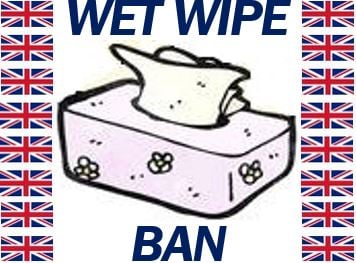Wet wipes could soon be banned in the UK.
The British government said that household wet wipes will be “eliminated” in the UK as part of Michael Gove’s crackdown on single use plastic.
Every year thousands of wet wipes are flushed polluting water ways and clogging mains sewers.
Thames21, one of the country’s leading waterway charities, recently collected more than 5,000 wipes alongside the Thames, near Hammersmith Bridge, in an 116 square metre area (half the size of a tennis court).
“The sheer quantity of these wet wipes shows the urgency of this problem”, said Debbie Leach, Chief Executive of Thames21. “As a country, action is being taken about other products which contain plastic such as bottles and cotton buds. We now need to widen our attention to include wet wipes and sanitary products which contain plastic and are being flushed into our rivers.”
Flushing a wet wipe isn’t disposing of it. It’s environmental littering.
Read this blog post from last year by Helen Wakeham, our Deputy Director of Water Quality: https://t.co/DnHjmYFbOL#binit4beaches #water #pollution #environment pic.twitter.com/myCE1gOX5w
— Environment Agency (@EnvAgency) May 7, 2018
Wet wipes account for most sewer blockages
An in-depth investigation of sewer blockages by Water UK, an organisation that represents major water and wastewater service providers, found that wet wipes flushed down toilets were the biggest culprit for blockages. The organisation said sewer blockages added £100m to water bills each year.

A spokeswoman for the Department for Environment, Food and Rural Affairs (Defra) said: “As part of our 25-year environment plan, we have pledged to eliminate all avoidable plastic waste, and that includes single-use products like wet wipes.
“We are continuing to work with manufacturers and retailers of wet wipes to make sure labelling on packaging is clear and people know how to dispose of them properly – and we support the industry’s efforts to make their customers aware of this important issue.”
